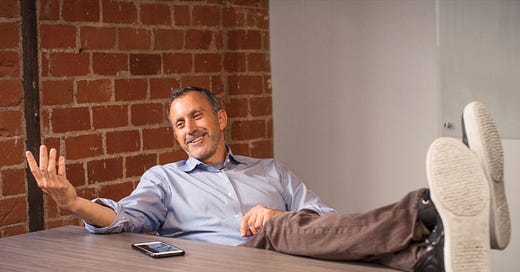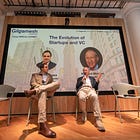This article is part of Fintech Leaders, a newsletter with 70,000+ builders, entrepreneurs, investors, regulators, and students of financial services. I invite you to share and sign up. If you enjoy this conversation, please consider leaving a review on Apple, Spotify, or Youtube.
I sat down with Howard Lindzon, a seasoned investor, entrepreneur, and founder of StockTwits, the largest social network for investors and traders. Howard is also the founder of Social Leverage, a venture capital firm that has backed great companies like Robinhood and eToro.
Often called "The Larry David of Finance" for his candid, no-nonsense takes on markets and investing, his newsletter and sharp social media commentary have earned him a loyal following among investors and entrepreneurs alike – not for sugar-coating reality, but for calling it exactly as he sees it.
In this episode, we discuss:
Why public market investing experience makes better early-stage investors
"Coding was the thing of the last 15 years, everybody needed to be in engineering school. Well, you don't need to be in school to learn how to invest in public markets. You can do that through podcasts and networking. So yes, it definitely has helped me, and it is definitely a mistake if young people are not doing it, because it is the ultimate language."
For Howard Lindzon, the public markets aren't just a place to make money – they're the ultimate proving ground for any investor. Unlike the illiquid nature of most private markets, public markets offer a brutal, real-time education in human psychology, market dynamics, and the true meaning of liquidity. Through his decades of experience, Howard has developed a sharp perspective on how public market trading shapes better private market investors.
"Watching prices, having liquidity, and being able to truly test your skills against everybody in the world in real-time is the ultimate game," he argues. This baptism by fire has informed his strategy at Social Leverage, where early bets on companies like Robinhood and eToro stemmed directly from his understanding of retail trading behavior and market infrastructure needs. The public markets taught him to spot not just good companies, but transformative platforms that could reshape how people interact with financial markets. This philosophy has shaped Social Leverage's investment thesis, leading to early positions in companies that are now defining the intersection of social media, trading, and financial technology.
His philosophy and approach to missing big opportunities, including Twitter, Zynga, and Carta
"Twitter was based on the fact that the valuation was $20 million at a seed stage investment, which sounds cheap in today's terms, but in 2007 that was like bananas. So it gives you some context for how the world has come around to the idea of seed investing and betting on startups. I didn't understand network effects, and even though I liked Twitter, I couldn't mentally do the math of how I could make money at a $20 million valuation. That's how far we've come since 2007 and network effects and social networks and AWS and the iPhone, and now AI – like what an idiot I am."
In venture capital, the stories of missed opportunities often teach more than the victories. Howard’s VC career has had three particularly painful misses that have shaped his investment philosophy. The first was Twitter at a $20M valuation in 2007 – a price that seemed expensive at the time but laughably cheap in retrospect. Despite being introduced to the deal by legendary investor Fred Wilson (USV), Howard couldn't wrap his head around the valuation metrics of social platforms. "I didn't understand network effects."
Then came the "bathroom pitch" – a hilarious encounter with Mark Pincus that could have made Howard an early investor in Zynga. During a bathroom break from a meeting in New York City, Pincus outlined his vision for the gaming company. Howard verbally agreed to invest at a $3M valuation, but when the paperwork arrived three months later with a $20M price tag, he balked. That decision cost him what could have been a $10M return.
The third miss was Carta (then eShares), where Howard saw the potential for disrupting cap table management but couldn't align with the founder's vision. "Even today, they're not doing what I think they could do," he reflects, highlighting how even correct market insights can lead to missed opportunities if investors can't get comfortable with a founder's vision and execution plan.
These misses shaped Howard's approach to early-stage investing. Being in the batting box is important, but he’s also learned that conventional metrics can be misleading when evaluating network-effect businesses, that founder conviction often matters more than immediate business models, and that the ability to evolve one's investment thesis is crucial in a rapidly changing technology landscape.
The evolution of markets from Web2 to the all-consuming "degenerate economy"
"Rule number one of the public markets is assume they're rigged. Otherwise you'll wake up every day mad at Elon Musk and mad at Goldman Sachs."
Howard has lived through every major market evolution of the past three decades, and he's convinced we're entering the most transformative phase yet – the "degenerate economy." This isn't just about meme stocks or crypto; it's about a fundamental shift in how value is created, traded, and understood in a world where traditional gatekeepers are increasingly losing their grip. Social networks, once hailed as democratizing forces, revealed themselves as centralized powers capable of pulling the rug from under creators and companies alike. "Facebook changing the algo is a form of a rug pull," Howard argues, drawing a direct line between Web2's broken promises and today's crypto skepticism.
But rather than rejecting this new reality, Howard sees opportunity in chaos. In a world where everyone from college students to retirees can trade 24/7, where meme coins can reach billion-dollar valuations, and where AI is reshaping market analysis, the old rules of institutional finance are being rewritten. This "degenerate economy" isn't a bug in the system – it's the system itself evolving.
The rise of platforms like Robinhood (which Social Leverage backed early) isn't just about commission-free trading; it's about a generational shift in how people interact with markets. "Markets are rigged, if you don't assume that, you're just gonna wake up every day mad," Howard explains. The key isn't fighting the rigged game, but understanding its new rules and players. Howard's thesis is clear: embrace the chaos, understand the new rules, and recognize that what looks like degenerate behavior today might be mainstream finance tomorrow.
A Return to StockTwits and Building in the AI Era... and a lot more!
"Now we're in this era of business people, and you don't have to be a unicorn, even though there's still people playing the game of unicorn. That's just like such a web two idea."
Howard's return to StockTwits signals a fundamental shift in how tech companies are being built and valued in 2024. After watching Web2's promise of infinite scale collapse under its own weight, he's betting on a different future. Web2's obsession with growth-at-all-costs has given way to a more nuanced understanding of sustainable business building. "In a scale world, StockTwits was overmatched," Howard admits. "But in a world where scale doesn't matter as much, there's a lot of opportunity."
Rather than competing head-on with social media giants, StockTwits is doubling down on what Howard calls "domain experience compounding" – the network effects that come from deeply understanding a specific market and its participants. With AI transforming how financial information is processed and shared, and the rise of what he calls the "degenerate economy" creating new forms of market participation, StockTwits is positioning itself at the intersection of community, technology, and finance. The goal isn't to be the next Twitter, but rather to build a sustainable business that serves its community profitably – a meaningful change from the unicorn-or-bust mentality of the past decade.
Want more podcast episodes? Join me and follow Fintech Leaders today on Apple, Spotify, or your favorite podcast app for weekly conversations with today’s global leaders that will dominate the 21st century in fintech, business, and beyond.
Previous Episodes You May Enjoy:


























Share this post